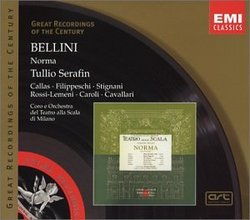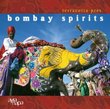| All Artists: Vincenzo Bellini, Tullio Serafin, La Scala Theater Orchestra, Ebe Stignani, Maria Callas, Mario Filippeschi, Nicola Rossi-Lemeni, Paolo Caroli, Rina Cavallari Title: Bellini: Norma (complete opera) EMI's Great Recordings of the Century with Maria Callas, Tullio Serafin, Chorus & Orchestra of La Scala, Milan Members Wishing: 1 Total Copies: 0 Label: EMI Classics Release Date: 10/7/2003 Album Type: Original recording remastered Genre: Classical Styles: Opera & Classical Vocal, Chamber Music, Historical Periods, Classical (c.1770-1830), Modern, 20th, & 21st Century Number of Discs: 3 SwapaCD Credits: 3 UPC: 724356264229 |
Search - Vincenzo Bellini, Tullio Serafin, La Scala Theater Orchestra :: Bellini: Norma (complete opera) EMI's Great Recordings of the Century with Maria Callas, Tullio Serafin, Chorus & Orchestra of La Scala, Milan
 | Vincenzo Bellini, Tullio Serafin, La Scala Theater Orchestra Bellini: Norma (complete opera) EMI's Great Recordings of the Century with Maria Callas, Tullio Serafin, Chorus & Orchestra of La Scala, Milan Genre: Classical
|
Larger Image |
CD DetailsSimilar CDs
|
CD ReviewsEMI Reissue: The Reluctant First Choice. Haas | Brooklyn | 08/07/2004 (5 out of 5 stars) "No opera collection should be without one of the Callas NORMAs. There is a surprising number from which to choose; each is deeply flawed. I agree with critic and Callas biographer Michael Scott when he suggests that her two best recorded NORMAs are the 1952 Gui and the 1955 Votto, both live. The former showcases her in top vocal form, albeit less sensitive and nuanced, while the supporting cast is adequate; the latter captures her tremendous characterization while it still enjoyed relative vocal health, and features a fine supporting cast (maybe even as good as her second Serafin?), but Votto's support is mostly dull and unsympathetic. Not to mention: sound quality! This 1954 is admittedly less than ideal, but I couldn't live without it. EMI's new GROC reissue is much more reasonably priced than before, and it has been digitally remastered for even greater impact. Most importantly, Tullio Serafin remains Callas's greatest partner-in-crime, a brilliant conductor, particularly in the bel canto repertoire. He makes the most out of this "big guitar" music, which oddly enough can become too beautiful for its own good. Bellini was perhaps the best composer of vocal music (besides Handel), and there is a reason why NORMA was an inspiration for Wagner and his "gesamtkunstwerk." The collaboration of Callas and Serafin is a singular representation of Bellini's visionary music drama. So, you may ask, what about the 1960 set? Good question. It's brilliant -- without a doubt!-- but no self-respecting discophile would recommend it as the premiere NORMA. Even with its supporting cast, one of the finest on record, and Serafin's mature conducting, it remains the essential complement to the 1954 (or, for that matter, the 1952 or '55). Why? Because Callas's Norma -- one of her greatest roles -- should be heard in its vocal prime. So, by default, we make due with her first studio session (as with Furtwangler's TRISTAN or Cellini's TROVATORE, both from 1952). What's wrong with it? Well, everything and nothing. The supporting players: Stignani, a grande dame of Italian opera and expert Adalgisa, is terribly old-sounding, especially in her characteristic middle register; additionally, Mario Filippeschi is gruff and unmusical, the undeniable weak link of the recording. Both possess merely adequate dramatic skill. Two good singers past their prime. Still, they're BY NO MEANS worth neglecting this set. Callas sings Norma -- the soprano Hamlet -- with ardor and responsiveness, though at times lacking the spontaneity of a live performance. Still, the sound is vibrant and stunning. One must make compromises; record collecting ain't easy. Serafin's leadership of the La Scala forces -- as well as the fine chorus work -- makes this an indispensable recording of great Italian opera. Some listeners will want to own one of the Sutherlands (probably her 1964) and possibly a Caballe (with Vickers?), but this 1954 is Amazon's top pick for a good reason. A classic." Wondrous recording BDSinC | Calgary, Alberta, Canada | 03/31/2005 (4 out of 5 stars) "This is one of a number of recordings I have with Callas, including one where Joan Sutherland plays Clotilde (this is a live recording and the sound is not great, but the performance simply sizzles and again Stignani is the Adalgisa). However, to this recording. At first I was not impressed with it like I felt I would be. Of course, Callas didn't disappoint at all, but the rest of the cast sort of bothered me. Norma's father was sung in a way with virtually no legato at all and sort of shoved out note by note. There was no characterization to speak of, but the voice was full (perhaps recorded very closely miked and forward). Pollione really sort of bothered me, as he is the first really important lead we hear. Of course, this role was sung by Mario Filippschi. He sounded old, but his high C was wonderful. I had to consult the booklet that came with the recording to learn a thing about him (which was precious little) but it did give his birth and death dates. The man was OLD when he recorded the role. He may have been a wonder in his younger days, as he was considered for the longest time the only tenor who could successfully sing the role of Arnoldo in Rossini's William Tell. However, when he recorded this opera, he was, well, nearing the age most tenors gladly stop singing. That said, with repreated listenings, I started to really see what he was offering the role. He had heart, he had masculinity, he had passion. And he did sing the notes. I found his diction much better than Stignani's and he sang the correct sound for most of his vowels (Stignani has a terrible habit of singing all the "e" vowels, said in Italian as an "AY" sound to those who speak English, with all sorts of vowel sounds, and it didn't matter if the vowel occurred in the passagio or not, so covering or darkening the tone for the passagio was not the reason). I also found he did play off Callas' Norma well. He could act with his voice, but in all truth, it is one of those non-descript voices that serves the music well and drifts out of the hearer's memory. No, he is not a Corelli, but he sings with far more finesse than Corelli does, and he never had to SCOUP up to his higher notes, and he followed the timing of the music perfectly. I really learned to appreciate his contribution to the opera. Then there was Stignani. I have many recordings of her, some made way back when (back with Gigli) and she was electrifying in them. She had better diction as well and didn't distort her vowels as she does in this recording. However, as with Filippischi, she is no spring chicken. She is a "great dame" by this point in her life. Her legato line was not as it should have been (or as it was in the live recording I have), but it was by no means bad. One could tell hers is a huge voice, and well, they never record well. There was a super strong "squillo" to the sound (incredible ring, which is what a singer wants, even Callas has it, though her production is far too forward) which in and of itself gives excitement to whatever she sings. Personally, I felt she was far too old for Adalgisa by this point in her career, even though she sings it well (though to those who don't know, the duets are sung in the lower keys used by Ponselle when she sang the opera, not in the published keys in the score). I really doubt her ability to sing higher notes was the reason for the lower keys, for at that time period, it was normal to use the lower keys. However, Stignani does dodge the high C in the first act duet with Callas, and it is sad, but not a loss. I am not sure about the characterization of her role, for I really didn't feel for a moment I was listening to the fears and loves of a young vestle virgin wondering what to do with her first love. At times, I almost thought she should be giving Callas advice on love, she seemed old enough to be her mother. Yet, that said, I came to really love the performance. It is said that Stignani sounds "old fashioned" and that is quite a good desciption. She sings the role as it was sung in the olden days of opera (some call the golden age) and many of her methods and approaches to singing the role were also sung by Telva when she sang the role against Ponselle's Norma. That was how the world saw the opera then. We see it differently, and partly because of Callas and her new approach to things. Now we get to the NORMA of the opera, Callas. I have a number of recordings of Callas in this role, this and another studio recording, and two live performances, one at Covent Garden with the Clotilde of Sutherland, and the Paris opera performance near the end of her career (where she flubs a High C in the last act, stops the performance and resings the phrase getting the note, and by the way, I was at that performance in person, so I had the opportunity to witness a Callas Norma, even if it was at the end of her career). Though I agree with everyone when they say they find more subtleties with the later recording (and you will find even more in the Paris performance), Callas' basic understanding of Norma never changes. She knows what Norma is all about right from the get go. Maybe that was her work with Serafin that did that (after all, she very openly attributes her way with a recitative directly to him, and that he taught her how to make coloratura make dramatic sense, and she certainly does make it make dramatic sense). Whatever it was, this was a role that will forever be associated with Callas, and like many say, she is the only real Norma out there. Sutherland, Sills, and Caballe may have sang the notes more beautifully, but they didn't grasp, or if they did they couldn't convey it in their voices, the depth of character, nor the emotional distress of the character. Everyone sings her "angry moments" well, but what most forget is this is a woman who has lived a life of a lie for years. She is not the virgin she pretends to be. And that personal disappointment, that knowledge of self, that inner knowing of one's own hypocrasy, is there, even when Callas opens her mouth to begin the recitative that will lead us into the Casta Diva. As when Callas sang Violetta, we knew she was sick right from the get go, we know that Norman is a tormented creature right from the first notes, which makes her caballetta after the Casta Diva meaningful, for after all, she is not wanting her lover to be destroyed. This recording has much to offer, and much joy to give. I rated it only 4 stars because of my reservations with the cast (it seems more often than not, Callas is paired with far inferior casts in her recordings, which is such a shame; imagine if she had singers, both men and women, equal to her in presentation, coloratura, musicianship, and in dramatic interpretation). However, having seen Norma many times by various artists, I tend to agree with one reviewer who stated that we sadly see anyone get up there and sing this opera really ruining it because they have no business being up there singing it, even if they have all the notes. Callas may have not had the most beautiful voice, but she had far more than all the notes, she had the entire soul of the character; Callas is Norma." Portrait of an Artist The Cultural Observer | 05/15/2005 (5 out of 5 stars) "No other role is more associated with Maria Callas than the role of the Druid priestess Norma. Throughout her career, what survived out of the ninety Normas that she sang showed a growth in Maria as an artist and as a vivid painter of this extremely complex role. An excerpt of her 1949 Norma from Buenos Aires shows a warrior priestess who is in complete control of her vocal resources. In that recording (Divina Records 12), Callas is in splendid vocal form, giving one of her most vocally delectable interpretations of Casta Diva. Already in 1949, we see an artist who understood the part, but still didn't offer us a feminine side to it. During that same year, a Cetra recording with the Casta Diva...Ah Bello a me ritorna excerpt was released, also finding her in splendid vocal form (akin to Ponselle's Casta Diva, only better in coloratura facilities). It was an amazing document of the young Callas' career, and I'd recommend it to anyone who would like to discover Callas' voice. A year later, we have her Norma in Mexico, and we find a more warrior-like approach to the music, but nonetheless it gave an amazing effect to the fury duets in the second act. Two years later, in London, we find Callas giving us more of the woman along with a Stignani who was in splendid vocal form. Then the Trieste excerpts (also by Divina) shows another side of Callas in which we see her development as an artist. This is very much like the Sunflowers of Vincent Van Gogh, where each successing Sunflower painting shows a more intimate and personal side of poor Vincent. The next Norma document we have of Callas is this studio recording. Once again, Serafin and Callas collaborate in this recording, and oh what a recording it was! Callas, of course, is the biggest star in this Norma, but other singers like Stignani and Rossi-Lemeni make an impact on it as well. Although Stignani well into her years (as was her voice), her great dramatic mezzo soprano timbre was amazingly so, an instrument of that served the role well. After all, she had sung the role with Gina Cigna. Stignani may have sounded matrimonly enough to be Norma, but her Adalgisa was in every respect grande and complete. It may not have Ludwig's amazing and youthful insight into the role, but what a force of nature her voice was! Rossi-Lemeni is also another dramatic force to reckon with, and he is an Oroveso I would treasure the more I listen to him. Mario Filipesschi though, is lousy. He was vocally able, but his interpretation was lacking and he sounded boring. Callas though, is beautiful sounding in this recording. She was a complete Norma vocally and dramatically, and every excerpt that showcases her abilities as a singer is simply exquisite. She was also slimmer when this recording was made, so there was a certain sensitivity to her voice when she sang this Norma. And then there is Serafin. No other conductor has approached the genius of this man. His perfect use of the bel canto tempo gives it a dimension that no other maestro would touch, and this is the reason why I would recommend this recording. Other great Normas would follow, but this was the recording that would put Callas' stamp on the role forever."
|

 Track Listings (17) - Disc #1
Track Listings (17) - Disc #1

